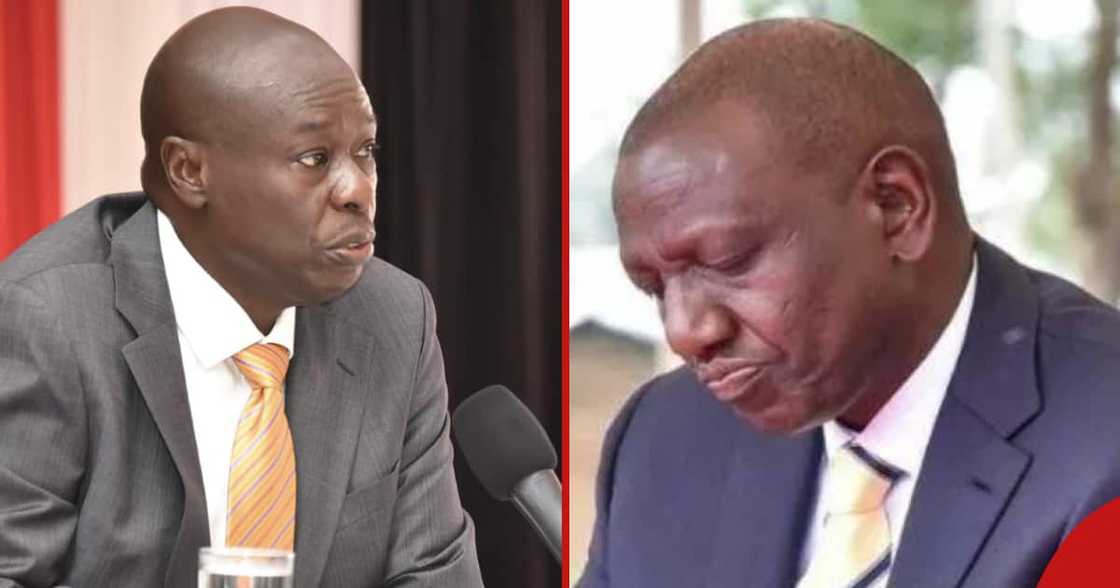President William Ruto’s political acumen is facing a significant test as tensions rise in the Mt. Kenya region following the impeachment of Deputy President Rigathi Gachagua by the National Assembly.
Ruto has sparked resentment in the region and inflamed ethnic sensitivities by orchestrating the ouster of his controversial deputy, who had ambitions to become the region’s top leader. Gachagua, once seen as a vital ally, was now viewed as a political liability.
“We know how this goes,” some leaders and residents backing Gachagua have said. “No Gachagua, no Ruto,” they chanted, underscoring the region’s overwhelming support for Gachagua in the 2022 elections, where they voted for the Ruto-Gachagua ticket.
Murang’a Senator Joseph Nyutu expressed the region’s sentiment, stating, “Divorcing Rigathi is divorcing the entire Mountain.”
The Senate is expected to decide Gachagua’s fate this week after the National Assembly overwhelmingly voted for his removal, with 282 MPs supporting the motion, including representatives from Mt. Kenya. Only 44 opposed it.
Gachagua, a skilled grassroots mobilizer, acknowledged that his impeachment had the President’s approval. “This motion couldn’t have moved forward without the President’s blessing,” Gachagua remarked during a press briefing at his Karen residence.
ALSO READ: CJ Koome Appoints 3 Judges to Hear Petition on Gachagua’s Impeachment
Ruto, meanwhile, has remained silent as his allies in Parliament push to oust the Deputy President.
Political commentator Macharia Munene believes the impeachment is deepening Ruto’s estrangement from Mt. Kenya. “Ruto lost the region’s trust a while ago, and Gachagua’s removal only adds to that,” Munene said. Gachagua has been crisscrossing the region, rallying support and stoking anti-Ruto sentiments.
The Deputy President has promised to reveal the government’s inner workings, further stirring tensions. Many observers believe his growing popularity could erode Ruto’s influence among Kikuyu voters.
However, political analysts like Mark Bichachi argue that while Gachagua is currently riding a wave of sympathy, it may not last beyond his removal from office. “The key question is how long he can sustain that sympathy,” Bichachi said.
ALSO READ: Gachagua’s Impeachment: Deputy President Trusts Judiciary Amid Ruto’s Silence
Political analyst Dismus Mokua has argued that President Ruto still commands the support of a majority in the Mt. Kenya region, despite the controversy surrounding Deputy President Rigathi Gachagua’s impeachment. Mokua dismissed Gachagua’s claims that Ruto had lost favor in the region due to the impeachment, labeling it as “politics of deceit.”
According to Mokua, Ruto could use the same strategy that secured him the region’s support in the first place—offering development and political benefits to maintain control. He noted that Ruto’s influence in Mt. Kenya was established well before Gachagua’s nomination as running mate. “Ruto has grassroots support across the country, and Mt. Kenya is secure, even if Gachagua’s replacement isn’t from the region,” Mokua said.
ALSO READ: Raila defends Adani Deal Says the Country is Struggling Financially
The President’s choice for Gachagua’s successor could play a critical role in shaping his political standing in the region. With strong allies like Interior CS Kithure Kindiki, Public Service CS Justin Muturi, former CS Moses Kuria, and National Assembly Majority Leader Kimani Ichung’wah, Ruto has key figures who can help retain a significant portion of the Mt. Kenya vote.
Ichung’wah, speaking in Parliament, reaffirmed this sentiment: “The mountain is intact. It belongs to all Kenyans.”
Among the top contenders for the Deputy President role is Kithure Kindiki, seen as a focused leader more interested in results than political showmanship. However, some analysts caution that simply picking another Kikuyu for the role may not be enough to restore Ruto’s popularity in the region. University lecturer Macharia Munene pointed out that Ruto lost the region’s trust when residents felt he didn’t keep his promises. He added that appointing figures like Anne Waiguru, Kimani Ichung’wah, or Kindiki may not reverse this trend.
Yet, political commentator Mark Bichachi suggested that appointing another leader from Mt. Kenya could still diffuse some of the current anger. “If Ruto chooses another Kikuyu to replace Gachagua, it could neutralize the backlash over the impeachment,” Bichachi said.
ALSO READ: 60% of Kenyans have no idea who should replace DP Gachagua if he gets impeached – Infotrak
Other analysts, however, warn that picking Kindiki could deepen divisions within Mt. Kenya. While it might boost Ruto’s standing in Mt. Kenya East—dominated by the Embu, Meru, and Mbeere communities—it could spark further rebellion in Mt. Kenya West, which is predominantly Kikuyu.
Despite retaining the loyalty of most MPs from the region, Ruto faces a potential challenge from Gachagua, who has strong grassroots support. This divide became evident during a recent public consultation where some residents chanted, “No Gachagua, No Ruto,” signaling growing unrest.
Macharia Mukua, a youth leader from Nakuru, warned that ignoring the region’s grievances could cost Ruto in the 2027 elections. “They need to listen to us. If they dismiss us now, they’ll lose our support when they need it most,” Mukua said.
Nyutu also warned that the region could withdraw support from both Ruto’s administration and his 2027 re-election campaign. “We haven’t seen Rigathi do anything that Ruto himself didn’t do as DP under Uhuru. But Uhuru never tried to impeach Ruto,” Nyutu remarked, adding that the motion would never have come forward without Ruto’s approval.
Political observers emphasize that Mt. Kenya’s backing was crucial to Ruto’s victory in 2022, with the region delivering approximately 3.5 million votes. Whether this support will hold without Gachagua remains a pivotal question.

